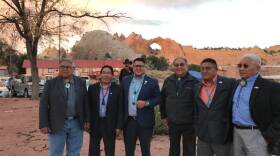Just a few weeks ago, KNAU’s Gillian Ferris brought us the profile of legendary environmental activist Katie Lee. She’s best known for her fierce opposition to the Glen Canyon Dam and the destruction of upstream canyons now submerged under Lake Powell. Sadly, that interview was one of the last Katie Lee would give. She died this week at her cliff-side home in Jerome, just a few days after her 98th birthday. Today, we have this remembrance of the Goddess of Glen Canyon.
Katie Lee was a lot of things to a lot of people. Hollywood actress. Folk singer. Author. Friend. Pistol. Stunning beauty. But it was her life as a river runner and defender of wilderness that many will remember most. Her first trip down the Colorado River through the Grand Canyon was in the early 1950s.
“I had a friend, Tad Nichols, who just called me one night and said you want to run the Grand Canyon?” said Lee. “And I said, ‘You know I can’t do that, Tad. I don’t have the money’. God, I was a struggling little actress out in Hollywood, I probably didn’t make $15 a week. I said, ‘I can’t.’ He said, ‘No you can go if you bring your guitar and sing to the people on the beach. Just $50 to cover your food, but you have to be in Flagstaff tomorrow at noon’ I was in Flagstaff tomorrow at noon you bet I was.”
One trip and she was hooked. Katie Lee left Hollywood for good and began exploring Grand and Glen Canyons. She took jobs with river companies in Arizona and Utah—one of the few women at the time to do so. She developed what she called “Explorer’s Syndrome,” rarely passing by a side canyon without stopping to investigate.
“And I was say, you ever been in there? No, never saw that one. I said, what about that one? Nope. Never been in there. I said, well we are gonna go in there and see what’s there, man! Do I feel lucky it changed my life out of Hollywood? You bet your sweet ass I do. Laughs. Yes ma’am,” Lee said.
Glen Canyon became the landscape of Katie Lee’s soul. She couldn’t get enough. She hiked and swam and camped as much as she could. In the days before sunscreen and expensive skin care treatments, she turned instead to the natural bounty of the river.
“I did what the natives did. They covered themselves with mud and lay down and let it bake. And then you pull it off or crack it off and get in the river and your skin is just like velvet. They knew what the hell they were doing,” she said.
As a joke, poking fun at mainstream society, she once tried to share this ancient beauty ritual with cosmetics mogul Elizabeth Arden.
“I sent some of that gorgeous mud in jars for mud packs, and she wrote back a very nice letter and told me she thought the idea was wonderful, but it wasn’t pure. OK lady, I’ll take mine, you take yours,” she said.
But when the federal government announced plans to build the Glen Canyon Dam and regulate the Colorado River, Katie Lee’s mood changed from joy to anger. She felt the flooding of Glen Canyon was a crime against nature, humanity and history. She never recovered from it.
“The way I describe it is an aneurism, an aneurism. It’s a stoppage of the blood in the body, and that’s what they’re doing to our rivers with these dams, what we’re doing to our planet, I mean, you cut off all the blood in your body, you die. You cut off all our rivers and we’re gonna be out of here. We can’t survive without them,” Lee said.
During the last few years of her life, Katie Lee became an icon of activism for young people discovering her work and life for the first time. She told them to fight hard even though she had no trust in the current administration to protect wilderness. And Katie Lee admitted she was tired of watching things she loved be destroyed for development. She was ready to hand things over to the next generation.
“I’m glad I’m checking out, baby. I mean I can’t stay here much longer at 97 years old. And I’d just as soon be gone when the total fascism takes place. I did the best I could, but I hope we don’t give up. I hope we get mad. And I hope there’s a (expletive) revolution,” she said.







